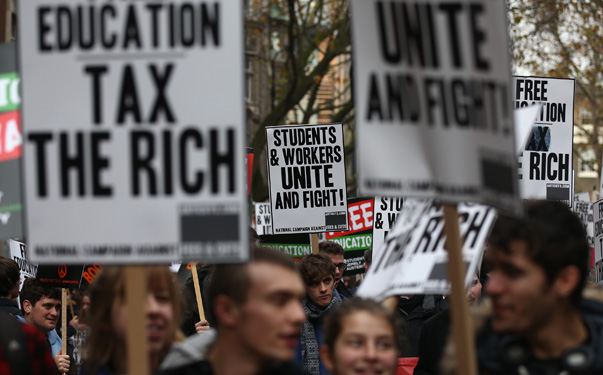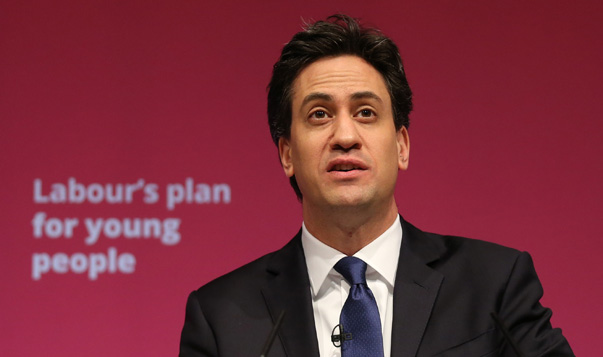Ed Miliband says a Labour government would cut tuition fees in England from £9,000 to £6,000 a year.
So students would pay less for their education and the taxpayer would make up the shortfall.
Labour says it will to raise the extra cash by changing pension rules and raising the interest rate for higher-earning graduates who are paying back their loans.
A storm of claim and counter-claim from all three main parties ensued, which if nothing else tells us that they see this as a key election battleground. Let’s try to make sense of it.
 “Ed Miliband’s sums don’t add up because the universities would get less money and there would be fewer students.”
“Ed Miliband’s sums don’t add up because the universities would get less money and there would be fewer students.”
George Osborne
Wrong, on the face of it. Labour’s plans don’t involve a cut in the funding universities get. And no one knows how this move would affect the numbers of students.
When tuition fees were raised from £3,000 to £9,000 a year there were widespread predictions that fewer people, particularly from poorer backgrounds, would want to go to university.
But in fact overall applications for full-time university places have gone up, and so has the proportion of students from state schools, lower socio-economic backgrounds and low-participation neighbourhoods, according to the Higher Education Statistics Authority.
Mr Osborne appears to be assuming that applications will go down if fees are cut now. Other commentators who welcome today’s announcement are making the opposite assumption. Who knows what will happen?
 “What is fraudulent about it is that this tax on pensioners will not go to universities, it will go to the Treasury. We know from all past experience that Treasury will pocket the money, and it will be used to reduce the deficit.”
“What is fraudulent about it is that this tax on pensioners will not go to universities, it will go to the Treasury. We know from all past experience that Treasury will pocket the money, and it will be used to reduce the deficit.”
Vince Cable
Labour’s policy is “fully-funded” in principle, in the sense that they have identified a change in the tax system that will bring in more money to offset the increased cost to the Treasury of cutting fees.
But Vince Cable raised an interesting objection to that when he suggested that the extra cash raised would not ultimately be spent on universities. Few revenues are really “ring-fenced” and the Treasury would just spend the money on the deficit, he suggested.
It’s true that under the current system, tuition fees are paid directly to universities, whereas Labour’s promise to offset the loss from lower fees would come from general taxation.
Mr Cable may be right about to say that the Treasury might true to divert the extra money from Labour’s pension changes elsewhere in the future.
But it’s rare for politicians to say that this is how the system really works, since all parties like to say that they are raising revenue or cutting costs elsewhere in the economy to pay for specific new policies.
His own party, the Lib Dems, say for example that they will pump an extra £1bn into the NHS over two years – and that this sum of money will come specifically from three specific changes to the tax system. Should we take that with a pinch of salt too?
 “It will mean more borrowing, higher taxes…”
“It will mean more borrowing, higher taxes…”
Greg Clark, Universities Minister
The fees cut won’t mean more borrowing if it’s really “fully-funded” by revenue-raising measures elsewhere, as Mr Miliband promises.
Paul Johnson from the Institute for Fiscal Studies agreed today that the shortfall will be funded by a “pretty much equal and opposite tax increase”.
That tax increase will hit people with incomes over £150,000. Tax relief on their pension contributions will be cut from 45 to 20 per cent. And the amount that people can pay into pension pots tax-free will be capped at £30,000 a year, or £1m over a lifetime.
 “We will raise the interest rate on those earning over £42,000 from 3 per cent to 4 per cent, which makes it a more progressive system.”
“We will raise the interest rate on those earning over £42,000 from 3 per cent to 4 per cent, which makes it a more progressive system.”
Ed Miliband
The IFS says the new system will not really be more progressive, because the increased interest rate for graduates who earn more than £42,000 won’t make up for the fact that those high earners will still have benefitted from the cut in fees.
Mr Johnson said those graduates who get the best jobs would pay less under Labour, while repayments won’t be any different for those earning a bit less.
The poorer half of graduates won’t be helped by a cut in tuition fees because they will never earn enough to pay back any less under the new policy.
Which is worth bearing in mind when Mr Miliband tells us that the average graduate is saddled with £44,000 of debt.
The figure is correct, but it doesn’t represent what most people really end up paying under the current system.
Mr Miliband failed to mention that an astonishing 73 per cent of graduates do not repay their debt in full after 30 years of work – at which point the government writes off the remaining debt.





